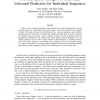Free Online Productivity Tools
i2Speak
i2Symbol
i2OCR
iTex2Img
iWeb2Print
iWeb2Shot
i2Type
iPdf2Split
iPdf2Merge
i2Bopomofo
i2Arabic
i2Style
i2Image
i2PDF
iLatex2Rtf
Sci2ools
DCC
2006
IEEE
2006
IEEE
Non-Asymptotic Design of Finite State Universal Predictors for Individual Sequences
In this work we consider the problem of universal prediction of individual sequences where the universal predictor is a deterministic finite state machine, with a fixed, relatively small, number of states. We examine the case of self-information loss, where the predictions are probability assignments which is equivalent to universal data compression. While previous results in that area are asymptotic only, we examine a class of machine structures and find an optimal method for allocating the probabilities to the machine states which achieves minimal redundancy w.r.t. the constant predictors class. We show analytic bounds for the redundancy of machines from that class, and construct machines with redundancy that is arbitrarily close to these bounds. Finally, we compare our machines to previously proposed machines and show that our machine with 300 states achieves smaller redundancy than the best machine known so far with 6000 states.
| Added | 25 Dec 2009 |
| Updated | 25 Dec 2009 |
| Type | Conference |
| Year | 2006 |
| Where | DCC |
| Authors | Amir Ingber, Meir Feder |
Comments (0)

